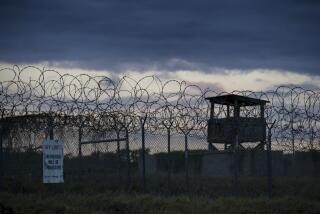Guantanamo Bay detainee, 68, dies of cancer
MIAMI — A 68-year-old detainee from Afghanistan who was being held at the U.S. prison in Guantanamo Bay, Cuba, died Sunday of cancer, a military spokesman said.
Abdul Razzak was the first of about 800 men jailed at Guantanamo Bay over the last six years to die of natural causes. He was diagnosed with colorectal cancer in September after complaining of abdominal pain, said Navy Cmdr. Rick Haupt, a prison spokesman.
Razzak, whose age was estimated by the military when he arrived at the prison in 2003, had been undergoing chemotherapy since October and was being held at the prison’s medical center in recent days because his condition had worsened, Haupt said.
A representative of the International Committee of the Red Cross, which is the only group allowed by the military to observe prisoners, was present “to witness the care provided to the detainee prior to and at the time of death,” Haupt said.
The group is allowed to visit prisoners on the condition that its representatives do not disclose information gleaned from the exchanges.
“The remains of the deceased are being treated with the utmost respect,” Haupt said.
He said the prison’s cultural advisor on Islam was making sure that the remains were handled in a religiously appropriate manner. He said an imam was en route to the base.
Razzak was the fifth detainee to die at Guantanamo Bay. The others committed suicide: two Saudis and a Yemeni in coordinated hangings in June 2006 and a Saudi in May.
An autopsy will be performed before Razzak’s remains are released to Afghan authorities, Haupt said.
The military said Razzak was a member of the Taliban and had fought against U.S. forces who invaded Afghanistan four weeks after the terrorist attacks of Sept. 11, 2001.
He was also accused, based on affidavits from anonymous witnesses, of commanding a Taliban terrorist cell, helping run a terrorist training camp near his native Kandahar and participating in an assassination plot against Afghan President Hamid Karzai.
Razzak was arrested in Afghanistan in January 2003, and was brought to Guantanamo Bay the same month.
At a November 2004 tribunal at the prison, the first formal examination of the military’s justification for his imprisonment, Razzak denied the claims against him and said he was living in exile in Iran at the time of his alleged offenses.
The tribunal panel deemed Razzak an “enemy combatant,” and two subsequent reviews of his case supported continued detention.
But the panel’s reports noted that an anonymous witness told U.S. forces that Razzak, a former taxi driver, was the victim of mistaken identity.
--
More to Read
Sign up for Essential California
The most important California stories and recommendations in your inbox every morning.
You may occasionally receive promotional content from the Los Angeles Times.











